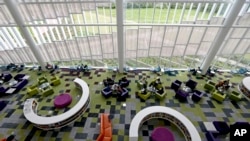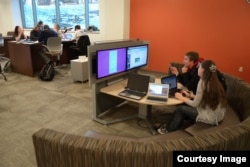Many U.S. colleges and universities are making big changes to their libraries, finding ways to serve students and succeed in an increasingly digital world.
The days of musty books on shelves, bound journals, card catalogs, long tables and rules governing behavior are long gone. Today, many campus libraries have cafes, group study areas where talking is permitted, and sofas designed for taking a short nap. Some are even open 24-hours a day.
Julie Garrison, dean of libraries at Western Michigan University, says the welcoming additions reflect the latest thinking about the millennial generation's learning habits.
Modern study habits
"We used to think about library design always in terms of the books. We were about first collections, then readers,'' Garrison said. "There is less of a need to protect a print collection in the way we did when it was the only way to get information, and we realized that if we let people bring in food and drink, they would stay longer.''
In place of books, students use laptops and connect to the internet with Wi-Fi. Students can study anywhere.
To keep up with the digital age, college libraries are now being equipped with media production labs. They also have high-technology "maker spaces'' where students can use 3-D printers and laser cutters, and data visualization walls where they can present projects.
'Complete shift'
On many campuses, information technology professionals work next to librarians.
Katherine Bergeron, president of Connecticut College in New London, says there really has been a complete shift in the idea of what a library is doing on a campus. She says the shift is from having a place where knowledge is preserved to a space for creation and collaboration.
However, Christopher Stewart says new technologies expand rather than replace traditional libraries.
The assistant professor at Dominican University in Illinois says technology continues to change the way the world works and libraries are no exception. But, he adds that students still need quiet space to just sit and think. The library has been and will continue to be that place.
This story was reported by VOA's Learning English service and contains information from an Associated Press report.






